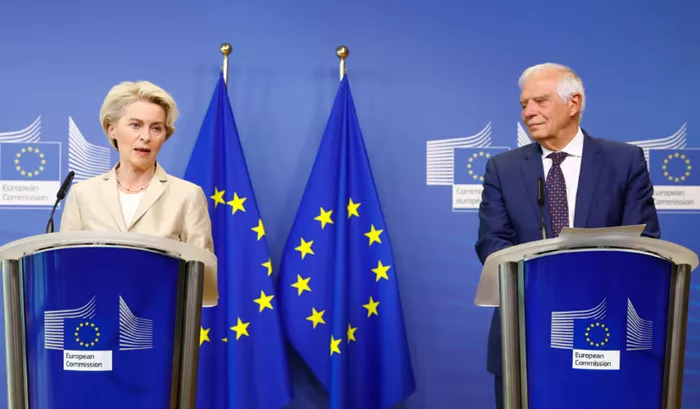The European Union’s long-anticipated 18th sanctions package against Russia has yet to materialize, weeks after the European Commission began preliminary briefings with member states. Diplomats across the 27-nation bloc are still awaiting formal written proposals that typically follow swiftly after these initial consultations—known in Brussels as “confessionals.”
The delay in drafting the next round of restrictive measures, prompted by Russia’s ongoing war in Ukraine, is reportedly due to two key factors: diplomatic caution surrounding recent peace talks and the need for coordination with the United States.
According to EU officials who spoke anonymously to RFE/RL, several influential member states, including Germany and France, preferred to assess the outcome of peace discussions held in Istanbul on June 2 before proceeding with new punitive measures. Despite initial hopes, the negotiations yielded no substantive progress, aside from an agreement to exchange thousands of fallen or severely wounded soldiers.
While Brussels harbored limited expectations for a breakthrough, officials say they hoped to give diplomacy every possible chance—an approach echoed by U.S. President Donald Trump. Though he has repeatedly threatened further sanctions against Moscow, Trump has so far refrained from imposing them, citing the fragile nature of peace efforts.
European diplomats say they are relieved that Washington has not accepted what they see as a premature or unfavorable peace deal. They remain eager for the U.S. to stay engaged and aligned on future sanctions, acknowledging that transatlantic coordination on punitive measures has weakened compared to the Biden administration’s tenure.
U.S. involvement is especially critical for advancing some of the package’s core elements, including a proposal to lower the G7’s Russian oil price cap from $60 to $45 per barrel. Although global oil prices have often dipped below the current cap, the U.S. resisted changes during a May meeting of G7 finance ministers. European diplomats are hopeful the issue will be resolved at the upcoming G7 summit in Canada from June 15 to 17, potentially setting the stage for a formal reduction to $50 or lower.
Other components of the proposed sanctions package mirror those of the 17th round adopted on May 20, expanding both the scope and reach of restrictions. Key measures under consideration include:
- Expanded blacklists targeting over 100 additional individuals and entities, building on a sanctions list that already encompasses more than 2,400 entries.
- Efforts to disrupt Russia’s shadow fleet, with the EU aiming to sanction hundreds of additional vessels suspected of helping Moscow evade oil export bans.
- Sanctions on Russian diplomats stationed across Europe who are believed to be engaged in espionage.
- Asset freezes and visa bans, along with possible re-listing of individuals previously removed from sanctions.
- New restrictions on the Nord Stream pipelines, amid renewed domestic discussions in Germany about the potential for their future use, despite no current gas flow.
- Further cuts to Russia’s access to the SWIFT payment system, with over 20 more banks potentially facing disconnection.
- Sanctions on the Russian Direct Investment Fund, and expanded bans on exports of industrial components that could support Russia’s military production.
As the European Commission continues drafting the formal legal text of the sanctions package, diplomats acknowledge the complexity of the task—especially when legal evidence is needed to justify measures that may be challenged in court.
Until then, EU capitals remain in a holding pattern, awaiting a document that could shape the bloc’s next steps in confronting Moscow’s aggression and reinforcing transatlantic unity.


